
Known Unknowns with Henrik and William
By Henrik and William
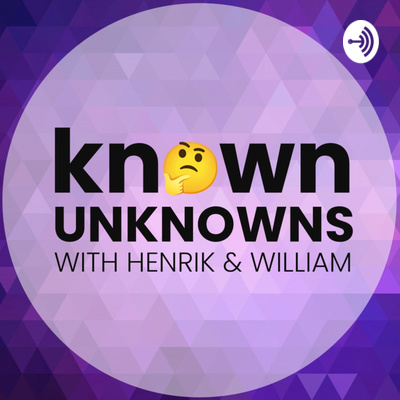
Known Unknowns with Henrik and WilliamOct 15, 2021

2.1: Getting Steve Faulkner wound up about accessibility
Steve Faulkner is really into accessibility.
”That’s all I’ve been doing for the last 20 years.”
Steve has been an accessibility engineer since 2001, first with Vision Australia and currently with The Paciello Group. He has a hand in developing HTML5 and WAI-ARIA specifications as a member of W3C working groups, and is the editor of W3C specifications on HTML5, Using ARIA in HTML, accessibility APIs, and text alternatives.
Or, for short – he’s been part of building the very foundation of what we call accessibility on internet today. So, what are the most common mistakes a11y noobs do when starting to care about accessibility? What was all the conflicts surrounding HTML5 all about? And why does Steve get so wound up when talking about the document outline algorithm?
Those things, among lots of other fascinating things, is discussed in this episode!
Links:
Web Components punch list: https://www.tpgi.com/web-components-punch-list/
HTML element t-shirt: https://www.etsy.com/uk/shop/HTMLZ
HTML ZED: https://www.etsy.com/uk/shop/HTMLZ
A decade + a year of heading backwards: https://html5accessibility.com/stuff/2021/03/21/a-decade-a-year-of-heading-backwards/
Not so short note on aria-label usage: https://html5accessibility.com/stuff/2020/11/07/not-so-short-note-on-aria-label-usage-big-table-edition/
Why debate non-text contrast of UI elements? https://iknowdavehouse.medium.com/why-debate-non-text-contrast-of-ui-elements-1be4313c9e12
Patrick H. Lauke on WCAG 3.0: https://twitter.com/patrick_h_lauke/status/1352385380314738695?s=20
Computer says NO to the document outline: http://html5doctor.com/computer-says-no-to-html5-document-outline/
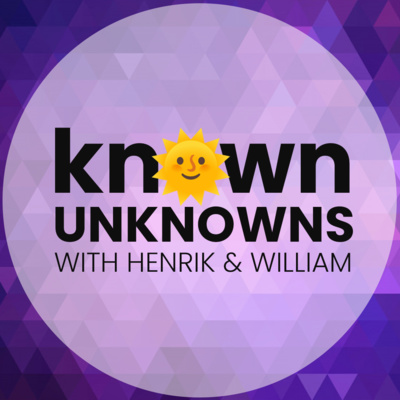
1.11: ”This was supposed to be a summer special”
Just another summer special, nothing special about that. Except the fact that the summer is already over, one might say. But that's incorrect! In the Northern Hemisphere, the autumnal equinox will occur on 22 September at 7.21pm GMT. That's almost two hours from now. (Nailed it!)
Anywho.
In this SUMMER SPECIAL episode, we talk about conventions. Why do we need conventions in a digital development setup? Is it ever a good idea to put together a Conventions Group to discuss and decide conventions that other people must adhere to? 🤔
Henrik is a strong advocate of conventions in general and convention workgroups in particular. William is conflicted, however. Which is a good thing because that means he could carry the Devil's Advocate hat throughout the entire episode without feeling the least uncomfortable.
Now, it might not be very special, but here it is: the very first summer special from the Known Unknowns!
Links:

1.10: ”At the end of the day, they were potatoes”
Have you ever applied to a job as developer and ended up with a bunch of ”code challenges” or ”tasks” to solve on your own and submit? One day, William had a brilliant idea; after participating as co-interviewer in a traditional interview with a candidate, he asked: ”How about we have a mob session instead of just sending [the person] an arbitrary code challenge?”
Henrik was, obviously, overwhelmed with excitement. And so was the Engineering Manager in charge of hiring! A few months later, mob interviews is gaining both ground and traction, becoming a thing within our organization.
In this episode, we explain what it is and how to apply it.
”Mob sessions and mob interviews are really focused on collaboration, working together. If that's the sort of thing you appreciate in your company, I suggest you try mob interviews. They are much more qualitative than just giving a person a code challenges. If thats how you going to do things in your organization... are you going to give a single developer a task and give that person a week to complete the task? I mean yeah, sure. Then you can give them a code challenge the traditional way,” William explains.
”Or if you're going to let that person work in a team in the agile way which involves working together, then you might want to try this as a way to see how that person would work in the future. Because that's what you want, right? You want the forecast of how this person is going to work for your company,” he adds.
Links:
Cyber-dojo: https://cyber-dojo.org/creator/home
”Is you taking notes on a criminal f** conspiracy?” (The Wired Season 3, Episode 5: ”Straight and True”): https://youtu.be/hGo5bxWy21g?t=77
Woody Zuill, ”A day of Mob Programming”: https://www.youtube.com/watch?v=p_pvslS4gEI&t=39s&ab_channel=JimmehAHJimmehAH
GOTO 2019, Mob Programming and the Power of Flow: https://www.youtube.com/watch?v=28S4CVkYhWA&ab_channel=GOTOConferencesGOTOConferences

1.9: ”The yellow meatball episode”
What is the difference between self-organizing teams and self-managing teams? What did Henrik and William learn about the updated Scrum Guide during a recent ”Scrum beer” with Swedish agile experts? And why on Earth is this episode titled ”The yellow meatball episode”?
”Words, they do matter. That's also why we talk about self-organizing or self-managing, even though I can't tell the difference right now, spontaneously. The concern I have when it comes to autonomy is the extreme form of autonomy, which is basically anarchy. Like, 'as long as we don't have to talk to anyone else we're autonomous, but once we have to ask someone else for advice or guidance or assistance, as soon as we have to communicate we're not autonomous anymore. The bastardization of autonomy. Basically, when I say that I don't really like autonomy in teams, what I'm saying is that I don't like to default into miscommunication or getting rid of communication,” Henrik explains when being under scrutiny from William. 😉
”If you have a company where everyone is keen on working in a very agile way, cell-based architecture could help you define as a PO what we want to do, give you the words that you need. In our organization, there's no end to the amount of people you could talk to. You don't want to waste time not communicating and you don't want to waste time over-communicating with people who doesn't know what you're talking about. Sometimes in the large companies it feels like we're building these cells but we're tying them to people,” William philosophizes in response to a discussion about the possibility of combining cell-based architecture with capability team principles.
And yes – we will definitely make a future episode about cell-based architecture. So stay tuned!
Links:
Scrum guide: https://www.scrum.org/resources/scrum-guide
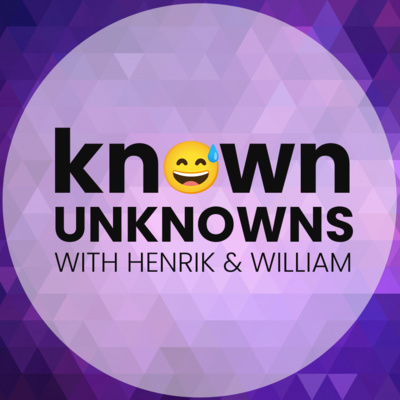
1.8: ”Failing miserably is fine as long as you don't fail the failure”
Why is it important to embrace and celebrate failure? And why is it important to foster a culture in a workplace where you are allowed to fail?
”Hopefully, your worldview is growing everyday. There's a bunch of things you don't know. So whenever you try something new you are going to fail at first, but ultimately you're going to learn something; your worldview will change. If you're not failing in life, that means you're actually not learning anything,” William the Wiseacre philosophize, referencing his recent studies of the Dunning–Kruger effect. 🤓
Henrik talks about a strategy he used to break a vicious circle of never-ending preparations and subsequent feelings of failure due to anxiety, and shares two very embarrassing anecdotes of past failures that have shaped him and his thought-process. 😅
”89.000 people got the 'Breaking news: Terror everywhere' newsflash. Needless to say, I felt terrible. I'm still embarrassed about this, but the positive outcome of it is that it wasn't the end of the world. I have been using this anecdote when talking to junior Product Owner colleagues who are afraid of doing something wrong,” Henrik explains.
Links:
Dunning-Kruger effect: https://en.wikipedia.org/wiki/Dunning%E2%80%93Kruger_effect
”Breaking news: Terror everywhere” (in Swedish): https://www.dagensmedia.se/medier/dagspress/mansklig-faktor-bakom-di-s-terror-push-6905400
Josh Lenn: https://www.joshlenn.com/

1.7: ”Open sourcing your code isn't sharing your profits, it's sharing your risks”
When Skolplattformen, a digital platform for schools in the Stockholm Region, was launched in 2018, it had already cost a staggering €100 million (roughly $120 million) of tax payers money – and the release was anything but successful. Bugs upon bugs, soon followed by critical security breaches. Out of pure frustration, developer and entrepreneur Christian Landgren (who also happened to be a parent forced to use the digital platform) decided to start an open source project fixing the most severe issues with the user interface as ”a Christmas gift” to all the ailing parents and teachers.
Little did he know that it would grow into an open source movement – and that by February 2021, it would result in a mobile app that within hours was the most downloaded paid app in Apple's iOS App Store.
”The feedback has been astonishing. I actually read a Facebook comment that said 'God bless them, they saved my life!'” says Johan Öbrink, digital strategist at the Swedish bank SEB, longtime friend of Christian, and one of four core programmers (together with Christian, Erik Hellman, Rickard Natt och Dag) of the Öppna Skolplattformen mobile app.
So... why did they decide to make it open source? How do you ensure stability and sustainability without any enterprise grade tooling and people behind an open source project? How do you, as an open source crusader, compete with inferior approaches?
”We like open source, we want to promote open source, and we especially want to promote open source for all code written by tax money. In this case it is not tax money, but it was important to have that part of the project as a vehicle for that discussion,” says Johan Öbrink.
”We have actually taken it so far that we are now kind of going out in podcasts and media saying that these projects should stop. Whenever you have that idea that we should start a big project, stop. And also, if you can, stop digital IT projects that have already cost €10 million. And that's overall, every part of society. You should never do those type of projects. If they cost that much, stop them”, says Christian Landgren.
Links:
• Öppna Skolplattformen on GitHub: https://github.com/kolplattformen/skolplattformen
• Öppna Skolplattformen on Twitter: https://twitter.com/oppnaskolplatt
• Öppna Skolplattformen on iOS App Store: https://apps.apple.com/se/app/%C3%B6ppna-skolplattformen/id1543853468
• Öppna Skolplattformen on Google Store: https://play.google.com/store/apps/details?id=se.stockholm.vardnadshavare&hl=en_US&gl=US
• Contributors: Christian Landgren, Johan Öbrink, Erik Hellman, Rickard Natt och Dag, Karin Nygårds (illustrations in the app).
• Information about Öppna Skolplattformen on the Stockholm City website.
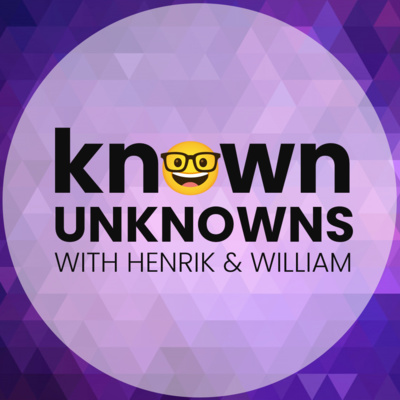
1.6: ”It’s about creating environments for people to meet, communicate, and do things together”
After mentioning the word ”culture” approximately a million times throughout the season, it's finally time to dedicate an entire episode to corporate culture. And since both Henrik and William are somewhat obsessed with collaboration, the focus is pretty obvious: How do you foster a collaborative culture within you team, workspace, or company?
Throughout this highly cultivating episode (pun intended), William shares an anecdote from a former workplace, raises the curtain behind the fluffy word ”collaboration”, and talks about a new experiment doing a mob session challenge instead of a traditional code challenge after interviewing a couple of candidates for recruitment. Also, he reveals that he was almost pissed-off at Henrik after the pair's first few interactions.
”There were no Jiras. I was like, 'this is not getting anywhere.' And the irony of that was that I said 'I have to get to work because otherwise nothing's gonna happen.' Now we're doing things and I'm like 'damnit, we didn't need Jiras – I thought we needed Jiras!'”
Henrik shares an example of toxic culture and really bad communication, talks about his experience as a hackathon facilitator, and why the lack of communication is the equivalent of failure.
”When we talk about collaboration, one of the things I often notice and get annoyed with is the mixup between the word 'collaboration' and 'cooperation'. For Christ's sake, a perpetrator could cooperate, you know. You could be a suspect cooperating with the police. That's not the same thing as collaborating. It's a totally different thing.”
About the mob session code challenge: If you're interested in trying it out yourself, we recommend Cyber-Dojo:
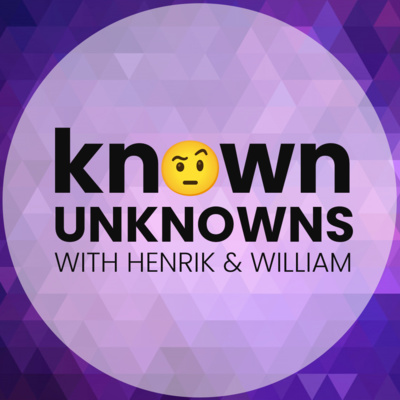
1.5: ”A good design system is a set of Legos where you can combine simple things to make more complicated things”
In this episode, we're dealing with design systems – but from a slightly different angle. Instead of talking about how to set up, develop, and maintain a design system, we discuss it from a consumer's perspective. And by ”consumer” we mean a development team within an organization utilizing and contributing to a design system.
”A lot of people have this gut instinct of 'now I'm just gonna be doing boring stuff because I can't have the wild west of all possible CSS available to me anymore. I think I've done so many bad design decisions in the past that I can see the benefit of not having to customize everything from the beginning," says today's guest senior software developer Kimmo Tukiainen.
In the episode, Kimmo shares his experience working with design systems, style guides, and shared component libraries, and he explains why a utilizing a design system is more beneficial than not.
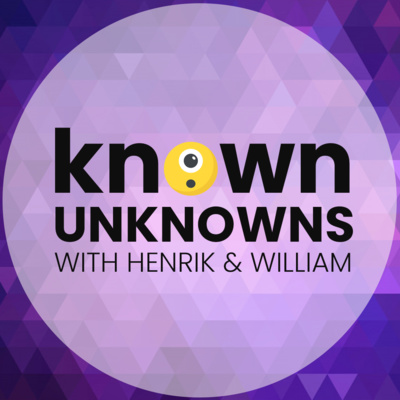
1.4: ”I'd rather default to being together, and if it's painful we'll figure it out”
In this episode, we're moving away from philosophical and organizational discussions and into some nitty-gritty technical details: Monorepo (mono repository), a single repository that stores all of your code and assets for every project. So, what's the difference between a monorepo and a monolith? What are the pros and cons of going mono? When and why should you use a monorepo instead of split repositories? Acting as the devil's advocate, Henrik tries his best to throw the full-fledged monoist William off his game.
”I like the monorepo way of doing things together, solving issues once instead of in all these different repositories,” William bluntly states, also taking the opportunity to coin a new term: Multi-package repository.
”Multi-package repository is more accurate and self-explanatory. A mono repository sounds like you're taking the monorail and you don't really know it means.”
Show notes:
- @telia/rush-select, William's nifty little tool to run multiple rush projects in one terminal.
- Monorepos: Please don't! by Matt Klein.
- Why Google Stores Billions of Lines of Code in a Single Repository.

1.3: ”The structural decomposition of an organization”
Most of us have heard of capability teams. But what exactly is the philosophy behind capability-aligned organizations? How do they differ from traditional product-aligned organizations? And how do you even define a capability?
Henrik and William dives right into the trending topic of capability teams, covering the most common capability-aligned patterns (experiences vs services and end-to-end product slices), the collaborative culture at Spotify, and the capability-compatible mindset of Martin Fowler.

1.2: ”Mob programming is a totally different way of looking at effectiveness and productivity”
When William first heard of mob programming, he thought of it as a joke. ”Some people do mob programming, they sit in a group and they do work together. And I was like... Why?” Of course, now he knows better. Much better, actually. So much that he's set out on a crusade together with Henrik to instigate change in their company – trying to turn mob programming into the standard way of working.
Henrik, on the other hand, usually sees himself as a joke in mob situations. 😅 ”My incentive back in 2015 was basically to learn as much as possible about everything. You thought: 'I want to be useful,' while my mindset was 'I'm useless.'”
After inviting Woody Zuill, the Godfather of mob programming, to a company conference, Henrik and William sat down to dive into the known unknowns of agile mob development.

1.1: ”The Devil might wanna try Lean UX”
”Design is a function, not a person.”
That's a pretty bold statement! But what does it mean? William has approximately three thousand questions about this core principle of the Lean UX philosophy. Guided by Henrik, the self-proclaimed guru of Lean-Agile methodologies (not really... but he is in fact a boisterous advocate of Lean-Agile philosophies in general and the Lean UX principles in particular), William tries to wrap his head around a way of working that includes ”prioritizing co-creation and having informal conversations to move the design forward,” and ”collaborative research distributed across the entire team, so that everyone can have exposure to it and develop a shared understanding.”
Little did they know they were both in for a ride, deciphering the first of (hopefully) many known unknowns.
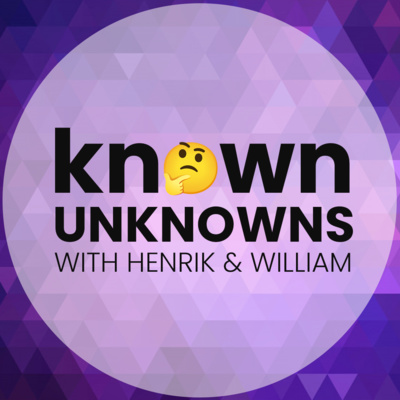
1.0: Trailer
Are you curious about product development, innovation, collaboration, and modern business related philosophies and methodologies? In that case, the Known Unknowns with Henrik and William might just be the perfect fit for you. In this podcast, our hosts Henrik and William, aided by our fabulous producer Florence Davaine, will cover these fascinating areas, with different topics and guest interviews in each episode.
Henrik is a senior product owner and digital strategist; William is a senior developer and frontend evangelist. They are colleagues at one of the largest telecommunications companies in Scandinavia, Henrik operating in Stockholm Sweden, and William in Gothenburg Sweden.
Now, let us dive into the Known Unknowns together.